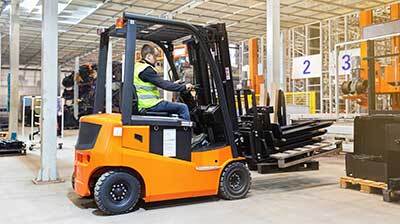
Introduction
A Forklift Operator Job can be an appealing career option, especially if you are a person who is willing to work in a warehouse department, distribution center, or industrial environments. However, before you decide to go ahead with this career path, it is crucial to gain a comprehensive understanding of what all Is required to start your career and how to excel in this profession.
In this blog post, we'll provide you with essential insights to consider before pursuing a career as a forklift operator.
-
Forklift Operation Basics
Before diving deep into the particulars, let's begin with the fundamentals. A forklift, often referred to as a lift truck or forklift truck, stands as a robust industrial apparatus employed for the lifting, conveyance, and stacking of materials. The role of forklift operators revolves around the safe and efficient operation of these machines.
-
Training and Certification
Becoming a forklift operator is not just a matter of hopping onto a forklift and getting to work. It's a profession that demands precision, skill, and, most importantly, safety consciousness. To operate a forklift legally and safely, proper training and certification are needed.
There are stringent regulations in place that mandate anyone wishing to operate a forklift to undergo formal training and obtain certification. These regulations are in place for good reason, as forklifts are powerful and potentially dangerous machines. Here's what you need to do for training and certification:
- Enrolling in a formal training program.
- Following a comprehensive curriculum that includes Forklift handling techniques, load management, maneuvering in tight spaces, and understanding the forklift's controls and features.
- Understanding the Safety Protocols
- Practical Training under the supervision of experienced instructors.
- Passing the Written and Practical Tests
- Upon successful completion of both the written exam and practical evaluation, you will be provided with certification.
-
Safety First
Prioritizing safety is paramount for anyone operating a forklift. These machines are heavy and have the potential to cause significant accidents if not handled with care and caution. Here we listed a few important precautions to follow:
- Wear Proper PPE including a hard hat to protect your head, steel-toed boots to safeguard your feet, and high-visibility clothing to ensure others can see you clearly.
- Follow Safety Protocols like pre-operational checks, ensuring load stability, and using the forklift's safety features, such as lights and alarms.
- Exercise extreme caution when maneuvering around people.
- Maintain a safe distance from edges, ramps, and other potential hazards.
- Avoid excessive speed, especially when turning or navigating tight spaces.
- Properly secure your load before transporting it.
- When not in use, park the forklift in designated areas with the forks lowered, the engine off, and the parking brake engaged.
- Ensure that the forklift is well-maintained.
Most of the employers mandate the above list of safety measures. Check the job descriptions of the Forklift Operator jobs now and apply.
-
Types of Forklifts
A wide array of forklift types is available, with each tailored to specific tasks and operating environments. Among the commonly used varieties are counterbalance forklifts, reach trucks, and pallet jacks. Gaining a comprehensive understanding of these distinct forklift types and their intended applications is crucial for selecting the most suitable one to match the requirements of your job.
-
Job Opportunities
The demand for forklift operator jobs is relevantly high in a multitude of industries, encompassing manufacturing, logistics, construction, and retail, among others. Before starting a career as a forklift operator, it's advisable to conduct thorough research on the job market within your geographical area. This research will help you gauge the current demand for forklift operator jobs and assess the potential for future growth, allowing you to make informed decisions about your career path.
-
Physical Requirements
Operating a forklift is a physically demanding task that requires a specific set of skills and physical attributes. To enhance the career in this role one should have:
- Excellent Hand-Eye Coordination
- Spatial Awareness
- Endurance for Prolonged Sitting
- Good Physical Condition
- Strength and Stamina
-
Continuous Learning
Embracing continuous learning and staying informed about industry advancements are essential aspects of being a successful and safe forklift operator. To stay updated, consider the following actions:
- Attend Training Programs
- Read Industry Publications
- Seek Certification Updates
- Connect with fellow forklift operators
Conclusion
Becoming a forklift operator can be a rewarding career choice, offering stable employment opportunities and the chance to work in various industries. However, it's essential to prioritize safety, receive proper training and certification, and stay informed about industry developments. By doing so, you'll be well-prepared to excel in this role and contribute to the efficient and safe operation of warehouses and industrial facilities.
If you are an individual who is looking to make a career as a Forklift Operator, we have listed the most relevant Forklift Operator Job Opening. Click here to view now.